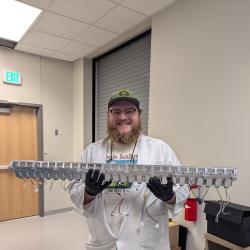Two from College Named 2015 Highly Cited Researchers
Two researchers from the University of Maryland's College of Computer, Mathematical, and Natural Sciences are included on Thomson Reuter’s 2015 list of Highly Cited Researchers, a compilation of influential names in science.
- Sankar Das Sarma, Richard E. Prange Chair in Physics, Distinguished University Professor, Fellow of the Joint Quantum Institute, and Director of the Condensed Matter Theory Center. Das Sarma was also included in the two previous compilations: 2014 and 2001.
- Jeremy Selengut, associate research scientist, Center for Bioinformatics and Computational Biology in the University of Maryland Institute for Advanced Computer Studies. Selengut was also included in the 2014 list.
Das Sarma’s research interests include condensed matter physics, statistical mechanics, and quantum information. A theoretical condensed matter physicist, Das Sarma has worked in the areas of strongly correlated materials, graphene, semiconductor physics, low-dimensional systems, topological matter, quantum Hall effect, nanoscience, spintronics, collective properties of ultra-cold atomic and molecular systems, optical lattice, many-body theory, Majorana fermion, and quantum computation. In 2005, Das Sarma, with colleagues Chetan Nayak and Michael Freedman of Microsoft Research, introduced the nu=5/2 topological qubit that led to experiments in building a fault-tolerant quantum computer based on two-dimensional semiconductor structures.
Das Sarma, a physics faculty member at UMD since 1980, received his undergraduate degree in physics in 1973 from Presidency College in Kolkata, India and his Ph.D. in theoretical condensed physics in 1979 from Brown University.
Selengut’s research focuses on bioinformatics, including developing hidden Markov models for proteins, particularly as they relate to bacterial and archaeal subsystems. His work has shed light on the genomes of organisms including those responsible for malaria and tuberculosis, and he has developed a series of tools and algorithms for the comparative analysis of microorganisms. He leads the Web interface, data coordination, and database design and management efforts of the University of Maryland/Battelle Tobacco Center of Regulatory Science. One of 14 nationwide centers established by the National Institutes of Health and the Food and Drug Administration, the center conducts research relevant to the Family Smoking Prevention and Tobacco Control Act. Selengut gained his experience in bioinformatics and databases through his work at the J. Craig Venter Institute. Selengut earned a bachelor’s degree in chemistry from Brown University in 1989 and Ph.D. in biochemistry from the Massachusetts Institute of Technology in 1994.
The Highly Cited Researchers list features 3,126 authors from 21 science disciplines whose published work in their specialty areas has consistently been judged by their peers to be of particular use and significance. These researchers earned the distinction by writing the greatest numbers of reports officially designated by Essential Science Indicators as Highly Cited Papers—ranking among the top 1 percent most cited for their subject field and year of publication. The 2015 Highly Cited Researchers list incorporates all of the feedback received between September 8, 2015 and December 1, 2015.
The Thomson Reuters Highly Cited Researchers list is one of several criteria used by the Center for World-Class Universities at Shanghai Jiao Tong University to determine the Academic Ranking of World Universities.
Media Relations Contact: Abby Robinson, 301-405-5845, abbyr@umd.edu
Writer: Mary Kearney
University of Maryland
College of Computer, Mathematical, and Natural Sciences
2300 Symons Hall
College Park, MD 20742
www.cmns.umd.edu
@UMDscience
About the College of Computer, Mathematical, and Natural Sciences
The College of Computer, Mathematical, and Natural Sciences at the University of Maryland educates more than 7,000 future scientific leaders in its undergraduate and graduate programs each year. The college's 10 departments and more than a dozen interdisciplinary research centers foster scientific discovery with annual sponsored research funding exceeding $150 million.







